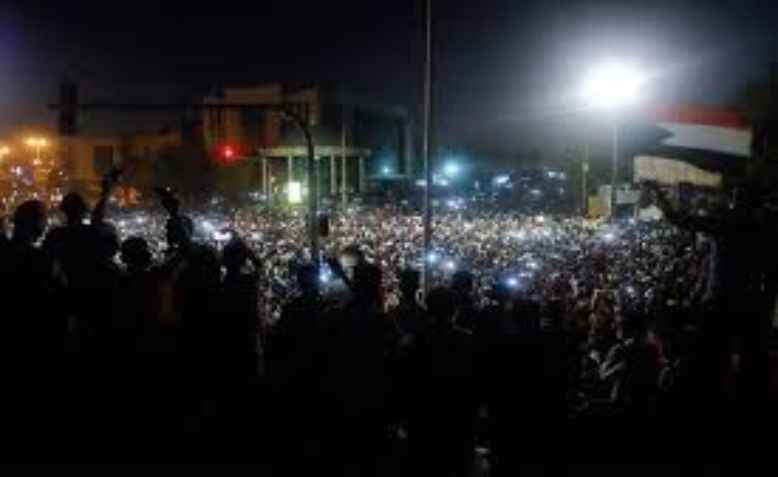 Sudanese protesters gathering in front of Army HQ. Photo: wikimedia commonsn
Sudanese protesters gathering in front of Army HQ. Photo: wikimedia commonsn
Months of fearless mass protest force one of the world’s most brutal military regimes, and its external backers, into a power-sharing deal, reports Susan Ram
The announcement, on July 5, of a power-sharing agreement between Sudan’s Transitional Military Council (TMC) and a coalition of opposition forces is the fruit of one of the most inspiring – and courageous — popular struggles of recent times.
Beginning in December of last year, hundreds of thousands of working people have been taking to the streets of Khartoum, the Sudanese capital, and other urban centres, demanding an end to the country’s 30-year military rule. In April, their pressure forced the removal of hated dictator Omar al-Bashir, whose lust for brutality and tally of war crimes had made him the first sitting president sought by the International Criminal Court.
As had happened across North Africa during the Arab Spring of 2011, the popular uprising in Sudan had toppled a loathsome military despot. But things didn’t stop there. Taking lessons from the crushing of those earlier revolts – in Egypt, Bahrain, Tunisia, Libya and elsewhere – the Sudanese movement pushed ahead towards the goal of civilian rule and constitutional government.
The tenacity of this movement, and its continuing ability to mobilise gigantic non-violent demonstrations, sent shivers down the spine of the TMC and its international backers: Saudi Arabia, Egypt, the United Arab Emirates and the Trump administration. By late May, the TMC decided to apply extreme repression to crush the movement. On June 3, protestors participating in a peaceful sit-in outside military headquarters in Khartoum were bludgeoned, raped and shot dead by the homicidal paramilitary Rapid Support Forces (RSF); more than 100 people were killed, including 19 children; many bodies were dumped in the Nile.
The military was jubilant, none more so than Muhammad Hamdan Dagalo (popularly known as Hemedti), deputy head of the TMC and controller-in-chief of the RSF and its 30,000 war-honed experts in savagery. “No more vandals on our streets”, he famously declared.
Then came Saturday June 30: the 30th anniversary of the coup that brought the military to power.
In an assertion of popular fury and determination that can have few recent parallels, hundreds of thousands of Sudanese people poured into Khartoum and other big cities, singing and chanting as they fused to form a million-strong force. They held firm in the face of tear-gas and live bullets (there were 11 deaths and hundreds of injuries).
It’s in the context of the epic courage and resolution shown by the people of Sudan that the just-announced power-sharing arrangement needs to be viewed. The military retains a dangerous degree of clout; in addition to its five seats on the proposed 11-member sovereign council (there will be five civilian representatives plus one civilian agreed on by both sides), it will lead the council for the first 21 months. But its actions will be scrutinised every step of the way by a vigilant, politically savvy population, ever ready to return to the streets.

